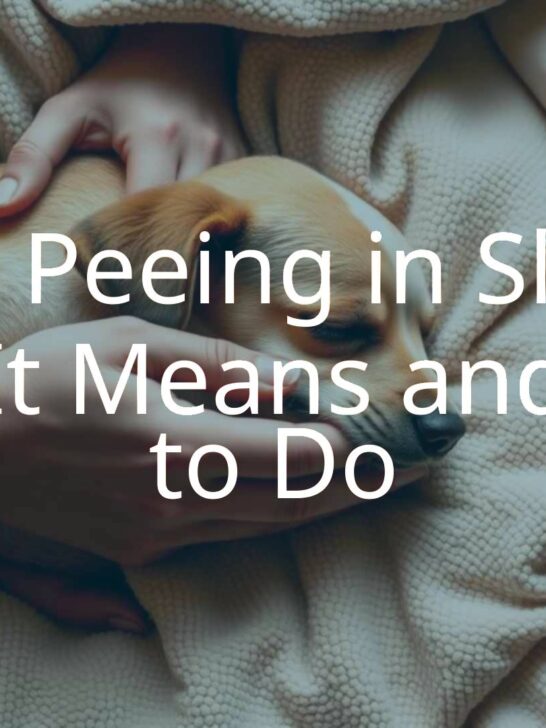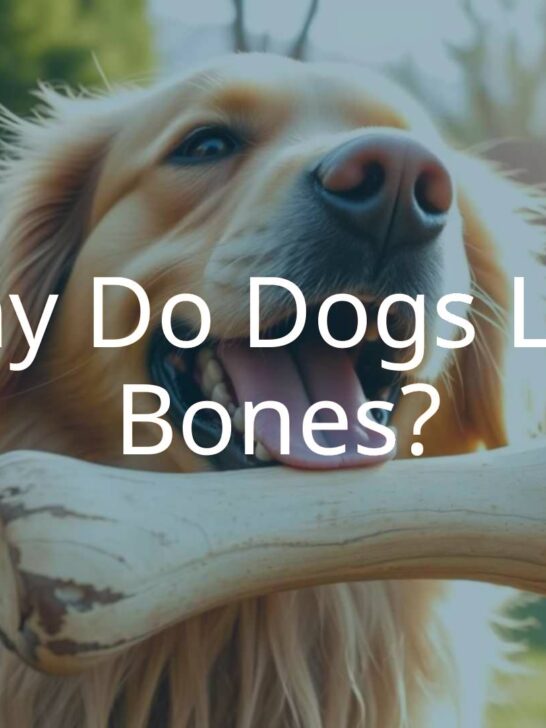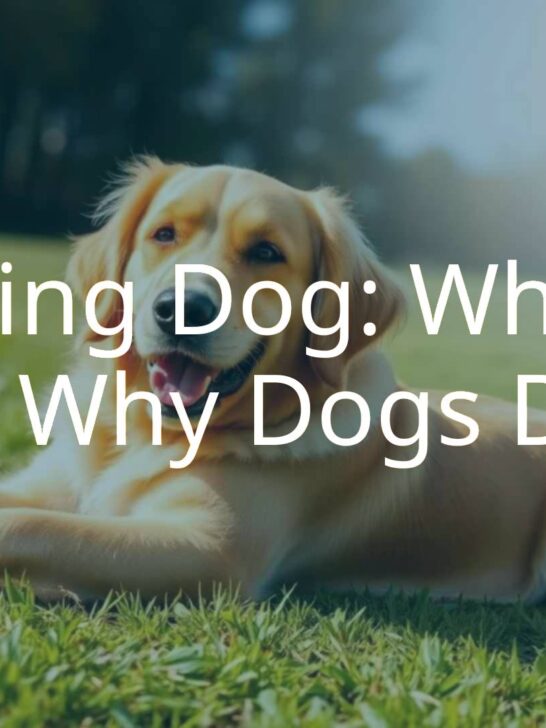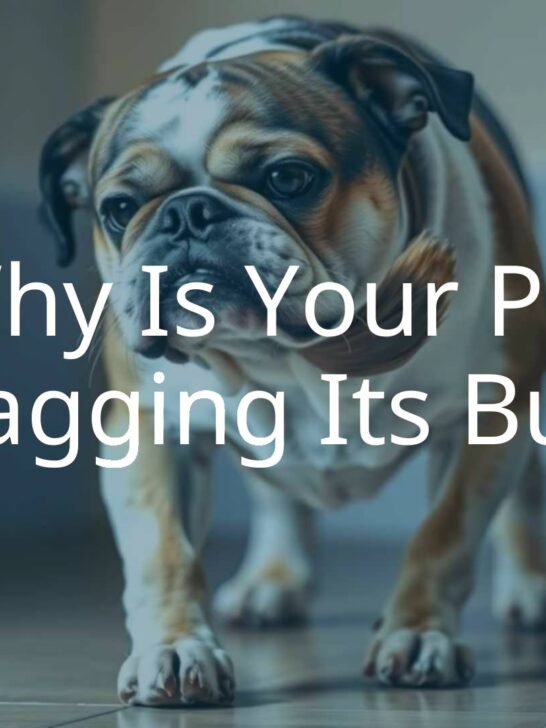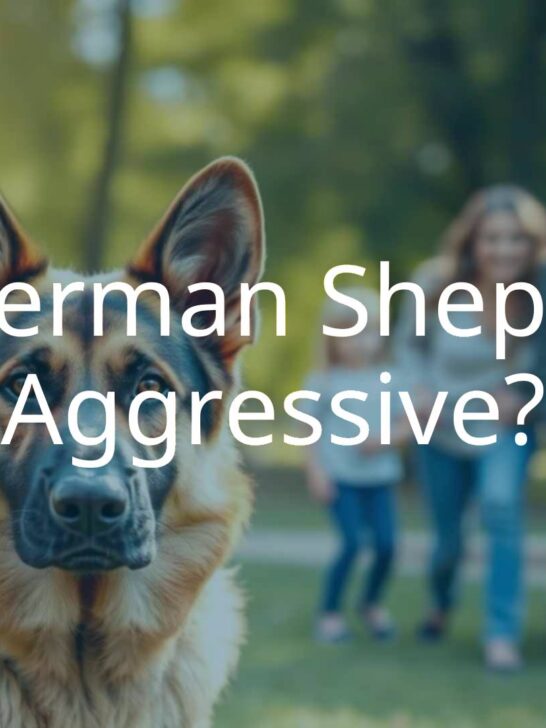How Do German Shepherds Show Affection? 9 Most Common Signs
The German Shepherd dog is a noble, loyal, and surprisingly affectionate working dog breed.
While the GSD, as many fans call this dog breed, got its start in Germany, today this is the second most popular dog breed in the United States according to the American Kennel Club (AKC) annual dog survey.
However, if you are new to owning dogs or new to the German Shepherd dog breed, you may not feel so confident that your dog is showing you affection.
So how do German Shepherds show affection?
We will take a deep dive into this topic, hearing from German Shepherd owners, canine behaviorists, trainers, and GSD owners on this important subject.

How Do German Shepherds Show Affection?
Every German Shepherd dog will have different ways of showing affection to their people.
The 9 most common signs of affection will include:
- Tail wagging
- Licking
- Leaning
- Jumping
- Body wriggling
- Eye gazing
- Vocalizing (like whining and barking)
- Laying down beside or on top of you
- Placing a paw on your chest
These are just some of the many ways that GSD owners say their pups show affection.
Watch a German Shepherd Showing Affection to Owner
As this short, heart-warming owner-made video clearly shows, German Shepherd dogs are incredibly good at showing emotion.
The viewer comments clearly show this as well – it is easy to imagine what the German Shepherd might be saying or thinking just based on the whines and barking and body language.
What Creates the Bond Between German Shepherd and Owner?
A number of variables can play a role in creating and maintaining the bond between you and your German Shepherd dog.
Some of these variables are quite simply chemical. They are part of the biochemistry of the human-canine relationship.
They are at some level even hard-wired into our brains and the brains of our canine companions.
But other factors are also important, including dog breed, training and discipline methods, the puppyhood experience, and even health.
So let’s take a closer look at each of these important factors as determinants of how strong your bond is with your dog.
Oxytocin
According to a recent research study published by Science magazine, the bond between you and your German Shepherd is maintained at least in part by oxytocin.
If oxytocin sounds familiar, it is because this is the same hormone that bonds human mothers with their children and animal mothers with their offspring.
Nicknamed the “feel-good hormone,” oxytocin is critical for bonding across species.
The study highlighted how when you interact with your dog by gazing at each other, both you and your dog produce more oxytocin in response to that eye contact than you would if you were not looking at each other.
In fact, in another study published by Science Mag that looked at both dog and owner pairs and pet wolf and owner pairs, mutual gazing caused oxytocin to rise by 130 percent in owner and dog pairs, but not an owner and pet wolf pairs.
And oxytocin levels did not rise among owner and dog pairs in the study that did not spend much time gazing at each other.
While oxytocin definitely plays a foundational role in creating the opportunity for you and your dog to bond and grow closer, it can only do so much on its own.
There are other equally important factors you will want to be aware of.

Dog breed
The results of an interesting research study published in Science Daily highlights the role of dog breed in facilitating a bond between a dog and its owner.
There is a genetic variant in the oxytocin receptor that only some dogs have. This variant makes dogs more susceptible to the effects of oxytocin and more likely to look to people for help.
As well, researchers discovered that some wolves have the same genetic variant and theorized it might be what led some wild wolves to be open to living and working more closely with people while other wolves kept their distance.
It is quite likely that the early wolves with the genetic variant were the wolves that evolved into the modern domestic dog.
Puppyhood experience
There is another perhaps equally important aspect that can influence how well your German Shepherd can bond with you and that is the experience your dog had in puppyhood.
As WebMD for Pets* describes, an Italian research study took a close look at behavioral differences between puppies separated from their litters at 30 to 40 days and at 60 days. (*link removed)
The survey looked at 140 dog/owner pairs.
Across the board, the dogs that were separated from their moms and littermates before 60 days had more behavior problems than dogs that stayed with their litters until at least 60 days had passed.
The researchers explained that this early period of puppyhood socialization is a critical life phase puppies need to adjust well to life with humans.
If puppies are deprived of this first 60-day socialization period with their mom and littermates, they are much more likely to become aggressive about food or toys or even aggressive towards their owners.
This in turn can be an obstacle to being able to develop a strong bond of affection with their people and can cause the dog to be relinquished later in life.
The researchers discovered that it doesn’t matter whether the puppy is a German Shepherd or another dog breed – this first 60 days with the mom and littermates is equally critical regardless of breed.
Training and discipline methods
Yet another factor that can enhance or detract from your bond with your German Shepherd is the type of training and discipline methods you choose to use with your dog.
There are two main schools of thought in dog training today: positive and negative.
Positive training sessions involve rewards for desired behaviors.
Negative training, similarly, involves punishments for undesirable behaviors.
The general school of thought today is that positive training methods do a great deal more to facilitate the owner-dog bond than do negative training methods.
The more praise, pats, gaze holding, treats, playtime, toys, and overall positive interactions you can have with your dog, the more affectionate and loving you are likely to feel towards one another.
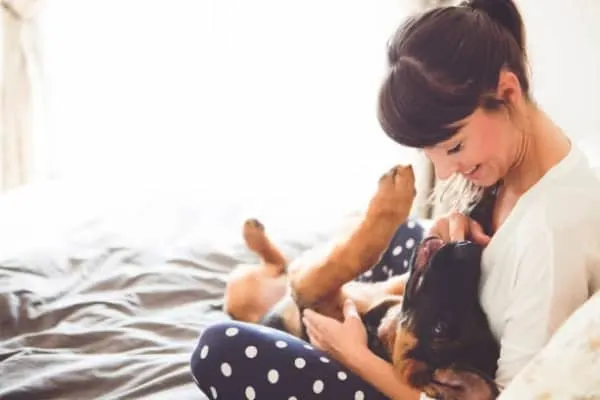
Health
Finally, while health isn’t usually the first place to look when there are problems developing or maintaining the dog-owner bond, it is important not to completely disregard health either.
There can be some overlap between signs that your German Shepherd dog isn’t feeling well and signs that there is a problem with the bond between you due to problem behaviors or other factors.
For example, if your dog’s behavior suddenly changes from jumping up to greet you into lying there listlessly, it may be that your dog isn’t feeling good, not that they don’t love you.
In the same way, if you notice your dog is doing more inappropriate elimination or is more destructive when you are gone, it could be separation anxiety but it could also be health issues related to the G.I. tract or dental health problems.
If you have tried everything else to deal with problem behaviors or a sudden distancing from your dog and nothing works, it is always smart to involve your dog’s veterinarian in the conversation.
Your German Shepherd Can Mirror Your Facial Expressions
Did you know that dogs have the ability to mimic your facial expressions?
National Geographic reports that dogs can accurately read human facial expressions.
But that is not all they can do. Your German Shepherd’s facial anatomy has literally evolved to be able to mimic those expressions back to you!
As PNAS journal reports, over the millennia of transition time from being wild wolves to becoming domestic dogs, the facial muscles in your dog’s eyebrows have changed.
Wild wolves today do not have the eyebrow muscles that can cause that signature look all dog owners recognize – “puppy dog eyes.”
That sad, mournful, begging and oh-so-cute expression is unique to modern dogs alone because only dogs have the eyebrow muscles to pull the expression off.
Researchers believe that modern dogs have evolved to mimic this particular expression because it is the expression that most reliably triggers nurturing reactions towards dogs.
This evolutionary difference is an advantage to modern domestic dogs because it allows your German Shepherd to bond more closely with you.
National Geographic also reported that dogs can tell the difference between a happy face and a sad face.
Eleven different dog breeds were tested, including one German Shepherd, and all the dogs were trained to tap a touch screen for one or the other in exchange for a treat.
The dogs performed very well in identifying both expressions.
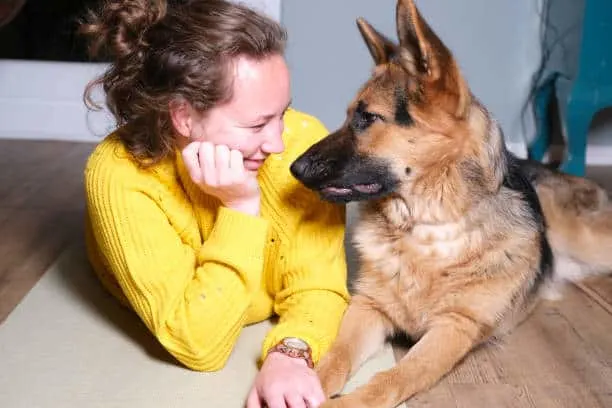
Your German Shepherd May Yawn When You Do and This Is No Accident
In even another incredible research study published in the respected PLOS One Journal, dogs were more likely to mimic a yawn from their owner than from a stranger.
This phenomenon is called “contagious yawning.” It occurs in a number of species, including some primates.
But as far as the researchers know, contagious yawning only crosses species between dogs and their people.
The researchers hypothesize that the ability dogs have to yawn contagiously when their owners’ yawn may be evidence that your dog can also sense or even feel your emotions, tapping into your emotional state on a deep level.
Specific Ways That German Shepherd Dogs Show Affection to Their Owners
Besides primates and laboratory rodents such as rats and mice, dogs may be one of the most popular animals for people to study.
We simply crave knowing more about the companion canines that mean so much to us!
While there is still so much more to learn about dogs in general and German Shepherds in particular, we have also learned a great deal already about how German Shepherds show affection to their owners.
Different GSDs may show affection differently
In addition to the general contributing factors that were mentioned here earlier – oxytocin, puppyhood experience, training methods, and health – there are some dog-specific factors that can influence how your particular GSD displays affection.
Just like some people are more likely to hug friends while other people may smile or shake hands or even give a kiss on both cheeks, some German Shepherds may be more inclined to whine and wriggle while others will lick or lean instead.
There isn’t one better way for your GSD to show you affection.
Just because your friend’s German Shepherd likes to show affection by kissing her hands and your GSD likes to cuddle up with you on the couch doesn’t mean anything except that the two dogs have different love languages.
And perhaps you do too!
Your German Shepherd will surely notice what you respond to most and will probably adjust their behavior accordingly to give you more of that.
Similarly, if your habit is to sit and watch television at night with your dog while cuddling and giving pats, then your dog is more likely to cuddle with you and seek pats as a show of affection.
Like the German Shepherd Dog Club of America (GSDCA) highlights, German Shepherds as a breed were developed to live and work closely with people.
The breed’s founder, an ex-calvary officer in German named Captain Max von Stephanitz, set out with a vision to create the perfect working dog – a dog of unparalleled work ethic and intelligence.
As the American Kennel Club (AKC) points out, anyone who has ever owned a German Shepherd knows these dogs basically want to be with you 24/7.
German Shepherds mature at different times
As this popular Reddit feed devoted to German Shepherds showcases, different German Shepherds may mature more quickly or slowly.
In this feed, GSD owners ask other owners when their GSDs began to display more obvious signs of affection towards them. Different owners talk about how their puppies behaved at different ages.
In some cases, the owners share that their puppies were affectionate right away.
In other cases, owners say it took some time for their dogs to open up – and also that having more interactive play and cuddling helped speed up the process.
If you have adopted a rescue German Shepherd, it is particularly important to be patient and let your dog open up and get to know you.
German Shepherds can be reserved at first, especially if they have been rehomed in the past.
Being relinquished or abandoned can hit these smart, sensitive dogs particularly hard.
But with time, patience, and lots of positive interaction and love, you can encourage your new dog to trust you and become more affectionate.
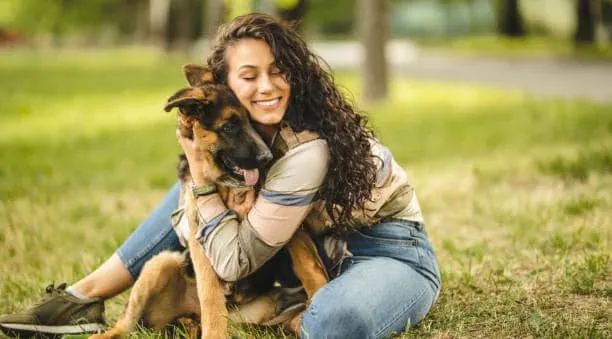
Are Female German Shepherds More Affectionate Than Male GSDs?
The matter of whether female GSDs are more affectionate or sweet-tempered than male German Shepherds is one of rather intense debate among owners and breeders.
Many GSD breeders that work with specific breed lines, such as German or American show dog or working dog lines, may have input as to their particular lineage.
For example, as Kavallerie Shepherds breeder and kennel states, their recommendation is to get a female if you are a first-time GSD owner and you want a sweeter dog that is easier to train.
The American Animal Hospital Association (AAHA) reports that a new research study has identified gender-specific traits for the German Shepherd dog breed.
While the data didn’t focus specifically on whether male or female GSDs are more affectionate, the study did highlight that males tend to have more aggressive traits than females.
They will also tend to be more protective of their owners, and their behaviors will reflect this.
Males also tend to be bigger and heavier than female GSDs, which may influence your choice if you are concerned about injury to young family members or you are slight yourself and need a dog you can handle more easily.
How DO German Shepherds Show Affection Towards Children?
Speaking of younger family members, another common question many people ask when they want to get a German Shepherd for the first time is if this breed is good with kids.
Are German Shepherds affectionate towards children? Can GSDs be trusted around young children?
This is a smart question to ask. According to Greencross Veterinarians, if you have young kids in your family and want a GSD, you may want to select a female.
Female GSDs are thought to be more tolerant of rough play from children that are too young to understand how to interact gently with dogs.
Female GSDs are also thought to be more naturally protective of young family members and gentler in general.
German Shepherds are a popular choice with families who want a family guard dog and protection dog.
As Aimsway German Shepherd breeders explain, it is always important to supervise a GSD puppy or adult dog with young kids.
With careful supervision and training, you can foster an affectionate and loving bond between your GSD and your kids.
Once your German Shepherd is properly socialized with your kids, you will have a loyal guard dog to protect your whole family from danger.
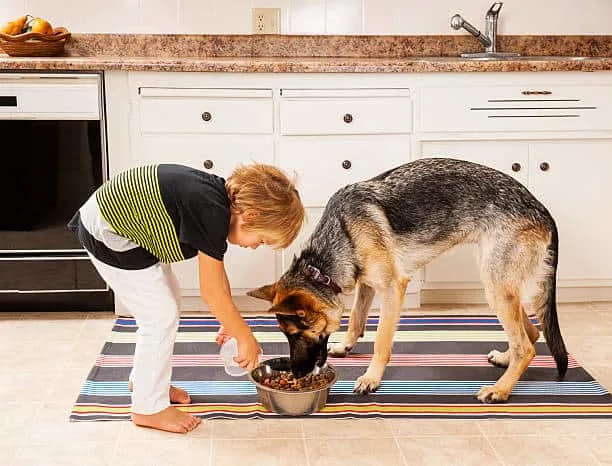
Will German Shepherd Dogs Bond With Only One Person?
Another common question that many new aspiring German Shepherd owners have about this dog breed is whether the GSD will bond closely with only one family member.
Here again, there is no universal agreement between German Shepherd owners, breeders, and canine trainers.
Male German Shepherds are thought to be more likely to bond closely with one family member over all the others, while female GSDs are thought to be more likely to share their affection equally between all family members.
As this popular German Shepherd owner forum highlights, German Shepherds do tend to bond more closely to the person that is in charge of their training and food.
This makes sense, as these are interactive experiences that take place every day and provide the dog with some of the most important essentials of life.
When your German Shepherd associates you, your presence, and your company, with interaction, play, food and treats, and other important daily life events, they may be more inclined to treat you preferentially.
However, as the owner forum comments show, this isn’t always the case.
Sometimes it can seem as if each GSD has their own reasoning for why they react to different people in their family in different ways. It isn’t always the person who feeds or trains them.
There is likely some influence based on how each person in the family interacts with your dog as well.
Because German Shepherds are so perceptive and intelligent, they may pick up on subtle cues that direct how (or if) they display affection.
Ultimately, the feedback from most GSD owners online is that their dog may bond a little more closely or visibly with one person.
But when a real danger shows up, their dog will protect everyone in the family from that threat.
One great way to help your German Shepherd develop a close bond with each family member is to involve everyone in feeding and training your dog.
This way your dog associates interaction and treats and good things with all family members relatively equally.
Is a German Shepherd a Good Choice If You Want An Affectionate Pet Dog?
If you are considering whether to add a German Shepherd dog to your family and you really want an affectionate dog breed, this could be a good dog breed to choose from.
However, it is vitally important to understand that German Shepherds cannot tolerate being left alone or even in the company of other dogs.
They need to be with their people and they need lots of daily play, exercise, training, and interaction to be happy and healthy.
If you can meet your German Shepherd’s needs, you are likely to be rewarded with a lifetime of affection in return.















